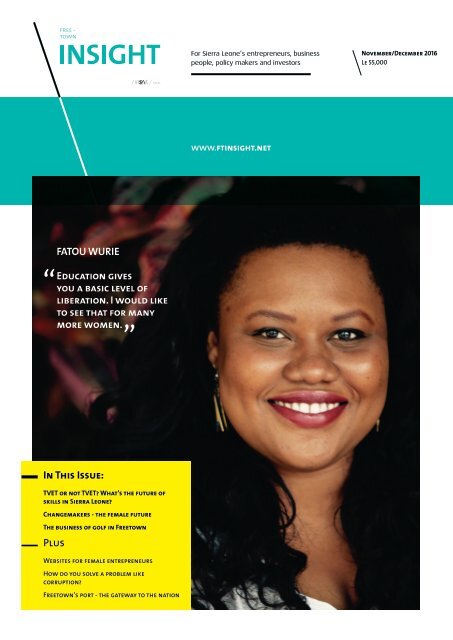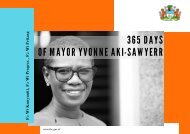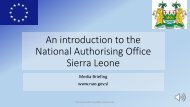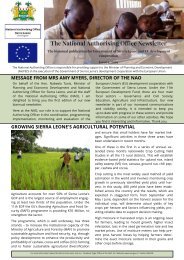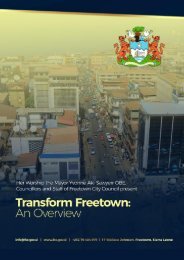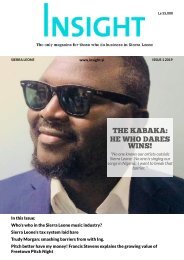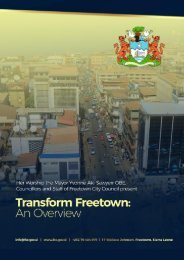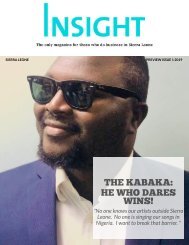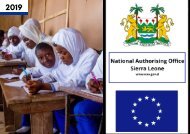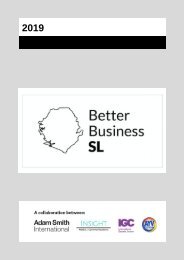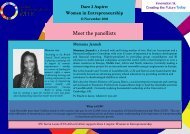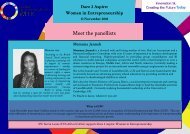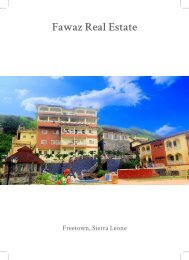Insight Magazine Nov/Dec 2016
Insight magazine - the only magazine for those who do business in Sierra Leone. In this issue, we ask TVET or not TVET? What’s the future of skills in Sierra Leone? We look into the future and see that all our changemakers have a female face. Golf is the game of business people all over the world. Who pays the price in Sierra Leone? Plus websites for female entrepreneurs, how do you solve a problem like corruption, and is Freetown’s port the gateway to the nation?
Insight magazine - the only magazine for those who do business in Sierra Leone. In this issue, we ask TVET or not TVET? What’s the future of skills in Sierra Leone?
We look into the future and see that all our changemakers have a female face. Golf is the game of business people all over the world. Who pays the price in Sierra Leone? Plus websites for female entrepreneurs, how do you solve a problem like corruption, and is Freetown’s port the gateway to the nation?
You also want an ePaper? Increase the reach of your titles
YUMPU automatically turns print PDFs into web optimized ePapers that Google loves.
For Sierra Leone’s entrepreneurs, business<br />
people, policy makers and investors<br />
<strong>Nov</strong>ember/<strong>Dec</strong>ember <strong>2016</strong><br />
Le 55,000<br />
www.ftinsight.net<br />
FATOU WURIE<br />
Education gives<br />
you a basic level of<br />
liberation. I would like<br />
to see that for many<br />
more women.<br />
“<br />
”<br />
In This Issue:<br />
TVET or not TVET? What’s the future of<br />
skills in Sierra Leone?<br />
Changemakers - the female future<br />
The business of golf in Freetown<br />
Plus<br />
Websites for female entrepreneurs<br />
How do you solve a problem like<br />
corruption?<br />
Freetown’s port - the gateway to the nation
Editor’s <strong>Insight</strong><br />
This time last year, the World Health Organisations had just announced the official end of the Ebola outbreak, and<br />
there was a distinctly optimistic mood in the country. Travel bans were being lifted, flights into the country were<br />
restarting and there was a rush of events centred on Sierra Leone’s resilience and investment potential.<br />
One year on, Sierra Leone’s business sector is feeling significantly more subdued. The government has<br />
announced sweeping cost-cutting measures in the public sector. It has upped the tax on imported alcohol and<br />
raised the price of electricity and fuel, just in time to catch the Christmas rush. The mining boom is a distant<br />
memory. Two big agricultural projects – Magbass and Addax - have hit the skids, leaving several casualties<br />
in their wake. Oil, shmoil! SMEs are feeling the pinch and Sierra Leone’s economic recovery is targeted at<br />
the very basics – education, health, energy, water, social protection, private sector development with an<br />
agriculture focus and governance. It’s a sombre picture. The reality however is a little more mixed.<br />
13<br />
We are in the curious position of having some really good hotels. Chains like Radisson Blu and Swiss<br />
Spirt and independents like the Hub are doing visibly brisk business. In 6-12 months, the Hilton will be<br />
opening its doors. Flash motors – a car rental business has weathered the peaks and troughs of Sierra<br />
Leone’s economy for several years – someone should really ask them how they’ve done it. Sea Coach<br />
continues to expand. On the SME front – Visit Sierra Leone (www.visitsierraleone.org) deserves a<br />
special mention as one of the country’s leading providers of tourism services. It rode out the Ebola<br />
epidemic to emerge fitter, stronger and with a range of innovative tourism ideas that really bring<br />
Sierra Leone’s individuality to the fore.<br />
FT<br />
<strong>Insight</strong><br />
3<br />
38 Spur Road, Freetown | Tel: +232 77 399399 | Website: www.swissspirithotels.com/freetown<br />
It is also clear that the economic contribution of women is more than significant. Based on<br />
no more rigorous analysis than observation, it seems that they bring a blend of academic<br />
achievement, entrepreneurialism and dust-yourself-down determination to the business arena<br />
and quietly build businesses that are meant to last.<br />
We’ve seen women whose CVs would guarantee them a penthouse office anywhere else in<br />
the world, lugging their rucksacks up several flights of stairs in Sierra Leone, to work in an<br />
environment where their skills and abilities do not get anything like the recognition they<br />
deserve. These are women who can simultaneously negotiate with international political<br />
and business leaders, run charities, fulfil their family and social obligations and continue to<br />
build on their professional success. These are women who are blasting their way to the<br />
top in a culture where the journey towards equal opportunities and rights for women has<br />
only just began.<br />
38 Spur Road, Freetown | Tel: +232 77 399399 | www.swissspirithotels.com/freetown<br />
FT <strong>Insight</strong><br />
+44 771 722 1023<br />
memunaforna@ftinsight.net<br />
The business world in Sierra Leone has been slow in adapting to female equality in the<br />
workplace. Patriarchy and patronage aren’t quite the same as equal opportunities. So<br />
in the spirit of encouraging a more productive dialogue around workplace equality,<br />
we are show casing some of Sierra Leone’s foremost business change makers – oh,<br />
and by the way, did we mention that they’re women.<br />
Editor:<br />
Memuna Forna<br />
Art Director:<br />
Erika Perez-Leon<br />
Advertising Enquiries:<br />
memunaforna@ftinsight.net<br />
+44 771 7221023 / +232 78799999<br />
www.ftinsight.net
<strong>Insight</strong>ful<br />
Isabel dos Santos (born 20 April 1973) is an Angolan investor<br />
considered by Forbes to be the richest woman not only in<br />
Angola, but the whole of Africa. In 2013, according to research<br />
by Forbes, her net worth had reached more than three billion<br />
US Dollars, making her Africa’s f irst billionaire woman. She is<br />
the daughter of Angola’s President José Eduardo dos Santos,<br />
who has ruled the country since 1979.<br />
Central African Republic –Catherine Samba-Panza<br />
(President interim since 2014)<br />
Mauritius – Ameenah Gurib (President since 2015 and<br />
the f irst popularly elected female head of state in<br />
this country)<br />
Rwanda had the highest number<br />
of women parliamentarians<br />
worldwide. Women there have<br />
won 63.8 per cent of seats in<br />
the lower house - See more at:<br />
http://www.unwomen.org/en/<br />
what-we-do/leadership-andpolitical-participation/factsand-figures#sthash.eeua1Nwy.<br />
dpuf<br />
The average<br />
entrepreneur in<br />
Uganda is a female,<br />
18-34 years of age,<br />
with at least secondary<br />
education, working<br />
in the consumer<br />
service sector.<br />
Folorunsho Alakija – Nigeria, is Africa’s<br />
second wealthiest woman, estimated by<br />
Forbes to be worth $2.1 billion. No, she<br />
didn’t make all her money from her<br />
fashion venture. Instead, a signif icant<br />
portion of Folorunsho’s fortune comes<br />
from her oil exploration company<br />
Famfa Oil. She also has investments in<br />
real estate.<br />
Only 34% of adults in<br />
Sub-Saharan Africa hold<br />
bank accounts in a formal<br />
f inancial institution, and<br />
only 30% of those formal<br />
accounts are held by women<br />
compared to 39% held by men,<br />
according to the World Bank.<br />
Liberia – Ellen Johnson Sirleaf (President since 2006 and the<br />
world’s f irst elected black female president and Africa’s<br />
f irst elected female head of state)<br />
Fly Blue Crane, which has been operating domestically<br />
within South Africa since its inception last September, will be<br />
conducting its very first international flight when it launches<br />
its service from Cape Town to Windhoek on May 13. The<br />
airline is under the leadership of CEO, Sizakele Mzimela, who’s<br />
also the first black executive vice president of South African<br />
Airways and the first woman to be selected to the board of<br />
the International Air Transport Association, AFKInsider reports.<br />
Freetown <strong>Insight</strong><br />
+44 771 722 1023<br />
info@ftinsight.net<br />
TABLE OF CONTENTS<br />
Top twelve websites for women entrepreneurs . . . . . . 6<br />
FT<br />
<strong>Insight</strong><br />
5<br />
The Women in Business Initiative was launched on March 21, <strong>2016</strong> during the<br />
Africa CEO Forum in Abidjan. Under the patronage of Dominique Ouattara,<br />
First Lady of the Republic of Côte d’Ivoire, this first meeting of women CEOs,<br />
private sector leaders and prominent business women in Africa, was attended<br />
by over 100 business women including African Development Bank’s Special<br />
Envoy on Gender, Geraldine Fraser-Moleketi.<br />
The World Bank’s 2014 Global Findex database on financial inclusion indicates that<br />
women in the developing world are 20% less likely than men to have an account at<br />
a formal financial institution and 17% less likely to have borrowed formally.<br />
Editor:<br />
Memuna Forna<br />
Art Director:<br />
Erika Perez-Leon<br />
Advertising Enquiries:<br />
info@ftinsight.net<br />
+44 771 722 1023 / +232 7879 9999<br />
Change makers . . . . . . . . . . . . . . . . . . . . . . . . 8<br />
Sierra Leone calls on petty corruption . . . . . . . . . . . . 16<br />
Maximising the potential of Freetown’s port . . . . . . . . 20<br />
TVET or not TVET . . . . . . . . . . . . . . . . . . . . . . . 22<br />
Surf ‘n turf at the Freetown Golf Club . . . . . . . . . . . 26<br />
In Digest . . . . . . . . . . . . . . . . . . . . . . . . . . . 30<br />
Awards, prizes, programmes . . . . . . . . . . . . . . . . 32<br />
www.ftinsight.net
Tech Talk<br />
Top twelve websites<br />
for women entrepreneurs<br />
African Women’s Development Fund:<br />
www.awdf.org<br />
New Faces New Voices: Women in Finance:<br />
www.nfnv.org<br />
The African Women’s Development Fund (AWDF) is a grant-making foundation that supports local, national and<br />
regional women’s organisations working towards the empowerment of African women and the promotion and<br />
realisation of their rights .By specialising in grant-making and focused, tailored movement-building programmes,<br />
they work to strengthen and support the work of African women’s organisations.<br />
African Women’s Entrepreneurship Programme:<br />
www.awepnetwork.org<br />
The African Women’s Entrepreneurship Program (AWEP) is a trade capacity building programme started by<br />
the U.S. Department of State in 2010. In partnership with the U.S. Agency for International Development, the<br />
programme provides firm-level technical support to sub-Saharan African women entrepreneurs to help them<br />
access the networks, knowledge, and capital they need to grow their businesses, export their products, and<br />
create jobs and economic growth in their countries.<br />
African Women in Business Initiative:<br />
www.afdb.org<br />
The African Women In Business Initiative (AWIB) responds to the African Development Bank’s Private Sector<br />
Development Strategy’s emphasis on the role of women in business as well as to calls to empower women<br />
entrepreneurs, in particular SMEs, through better access to finance.<br />
Female Entrepreneur association:<br />
www.femaleentrepreneurassociation.com<br />
Read the stories of female entrepreneurs from around the world and get inspired and empowered to succeed in<br />
your own business. They have published stories on a wide range of women, from girls in their teens, to women<br />
in their sixties, from student entrepreneurs, to mum entrepreneurs! From women who quit their job to start a<br />
business, to women who were made redundant and so started a business.<br />
Grace Machel Trust:<br />
www.gracamacheltrust.org<br />
Their mission is to to amplify the voices of women’s movements, influence governance, and promote women’s<br />
leadership and contributions in the economic, social, and political development of Africa. They also advocate for<br />
the protection of children’s rights and dignity.<br />
Lionesses of Africa:<br />
www.lionessesofafrica.com<br />
An online community which welcomes young women entrepreneurs who are looking for advice, insight, and<br />
a platform where they can promote and share their own business ideas. Lionesses of Africa is where today’s<br />
successful women entrepreneurs from across the African continent get the chance to send the elevator down to<br />
the next generation of young women who will follow in their footsteps.<br />
New Faces New Voices is a Pan-African advocacy group that focuses on expanding the role and influence of<br />
women in the financial sector. They believe that women have the potential to deliver a significant contribution<br />
to economic growth in Africa. To this end, they engage with decision-makers at national, regional, continental<br />
and global levels to better harness women’s economic potential. Their research shows that if the financial and<br />
business sectors become more inclusive to women, the result will be a large-scale and fundamental shift in the<br />
business and financial landscape across Africa.<br />
Quantum Leaps:<br />
www.quantumleapsinc.org<br />
Quantum Leaps accelerates the global development of women’s enterprise by catalysing<br />
strategic initiatives that build capacity, change policies, grow economies and create jobs.<br />
She Leads Africa:<br />
www.sheleadsafrica.org<br />
She Leads Africa is a community that helps young African women achieve their professional dreams. With<br />
engaging online content and pan-African events, their vision is to become the #1 destination for smart and<br />
ambitious young women.<br />
The Christian Women Entrepreneurs’ Network in Africa:<br />
www.cwena.org<br />
Christian Women Entrepreneurs’ Network in Africa (CWENA) is a faith based Women Empowerment and<br />
Support organisation that offers women from all walks of life practical business training skills to enable start<br />
up businesses and organisations, motivate growth in existing businesses and encourage sustainability through<br />
business coaching and mentorship.<br />
Vital Voices Global Partnership:<br />
www.vitalvoices.org<br />
Their mission is to invest in women leaders who improve the world, partnering with them to make that vision a<br />
reality, through long-term investments that expand skills, connections and visibility.<br />
Women4Africa:<br />
www.women4africa.com<br />
Women4africa is a UK registered organisation focused on celebrating and empowering Africa and its women by<br />
supporting and celebrating their role in their communities via Conferences, supporting education and bestowing<br />
prestigious awards, recognitions and special honours on such women identified and nominated by the public.<br />
FT<br />
<strong>Insight</strong><br />
7<br />
www.ftinsight.net
Change Makers<br />
Sierra Leone generally makes the international news<br />
for all the wrong reasons, particularly when it comes<br />
to women’s issues. There is no denying the amount of<br />
work still to be done in the area of Sierra Leone’s gender<br />
relations. One way that change is arriving is through<br />
the rapidly growing number of positive, resourceful<br />
women who are leading businesses and organisations<br />
that make an impact, as well as leave inspiration in their<br />
wake. The women we have talked to for this issue are<br />
professionalising their respective sectors, and improving<br />
the social and business landscape for women and men in<br />
Sierra Leone.<br />
How does your work contribute to Sierra Leone’s economic development?<br />
What my work does is invest in people through effective programmes that boost people’s confidence,<br />
empowering women to engage in small medium enterprise as a way of escaping violence and be more<br />
independent. My work contributes to economic sustainability by getting girls back to school and reducing<br />
illiteracy. The vulnerability of women and young girls as a result of violence, poor health systems, lack of<br />
education, access to clean drinking water and poverty has an impact on the long term economic growth of the<br />
country. Most women in Sierra Leone work within informal settings.<br />
Who has been your greatest mentor and what did they teach you?<br />
My mother. She taught me at an early age that success comes with determination. But at the same time to<br />
always seek to improve the lives of all Sierra Leoneans where ever I find myself.<br />
Nominate the HeForShe champion for change who you think has had the most impact to date in Sierra Leone?<br />
I have a long list to choose from but most notable is my father, the epitome of a HeforShe. He taught us as girls<br />
that we can be anything we want to be and no one should tell us otherwise. His Excellency the President Dr.<br />
Ernest Bai Koroma who as a child was my neighbour in Freetown. I know he is a very devoted father, husband<br />
and brother. I applaud his recent decision to appoint a number of women in his Cabinet which tells me he is<br />
definitely a HeforShe- paving the way to have women leading in politics.<br />
Edleen Elba,<br />
The human resources specialist<br />
Alimatu Dimonekene,<br />
The community activist<br />
How would you describe your job?<br />
I am a community activist and the founder of ProjectACEi. I have three careers which<br />
I am passionate about. Being a proud daughter, a mother to three amazing children<br />
and working on the issue of violence against women. All these roles are demanding<br />
and challenging, but I wouldn’t have it any other way. Being in a position to make a<br />
difference in the world is very rewarding.<br />
How did you get into this field?<br />
I got into the field of campaigning because I had a strong desire to make a difference<br />
in the lives of other girls and women. Whilst a student at Birkbeck College in London studying Social Policy, I<br />
was encouraged to pursue this area. My joint degree in Third World and International Studies with Sociology<br />
further increased my passion for women’s rights and gender equality, and was an ideal preparation for the role<br />
I’m in today. My experience continues to grow as I collaborate and partner often with other organisations and<br />
individuals on projects and initiatives concerned with promoting a world where women and young girls can<br />
achieve their dreams.<br />
What would you say are your most significant professional achievements?<br />
Probably the most notable accomplishment was recently contributing to robust reforms, policies and legislation<br />
in the United Kingdom around defined strategies for protecting women and girls from violence and abuse. The<br />
meetings which began in in <strong>Nov</strong> 2012 went on till July 2014. I was awarded Winner of the True Hero Award<br />
2015 for my work in tackling FGM. In <strong>Dec</strong>ember 2015, on behalf of the African Union I co-hosted Youth Delegate<br />
Panel discussions at the First Girl Child Summit, held in Lusaka, Zambia. The Youth Panel discussed ways to look<br />
at combating Child and Early Marriage and the wider impact on teenage pregnancy globally. My co-host was<br />
highly acclaimed Nigerian Actress Omotola J Ekeinde. In order to deliver this aspect of the discussions, I needed<br />
to mobilise youth from over 50 countries in Africa. In the end, we delivered a successful summit. I am currently<br />
working as a Consultant/Trustee on a project founded by Lisette Mibo Passion For Motherland (PFM). A charity<br />
supporting homeless children in the Democratic Republic of Congo. This is my most challenging role. Ensuring<br />
that the homeless children have safe homes this <strong>Dec</strong>ember. I am joining the Team at the PFM Showcase this<br />
August as we are aiming to raise enough funds to build the first shelter for homeless children in Kinshasa.<br />
How would you describe your job?<br />
I own and manage a nine-year old human resources management company called<br />
JobSearch. We provide recruitment, skills development and human resources<br />
management services.<br />
How did you get into this field?<br />
I am a Chartered Global Management Accountant and Human Resources Analyst; a<br />
member of Chartered Institute of Management Accountants (CIMA) and American<br />
Academy of Project Management. My career as a Management Accountant and<br />
Human Resources generalist spans over 13 years in the private and public sectors, seven of which were in Senior<br />
Management. My areas of expertise are Strategic HR Management, Risk Management, Financial Management<br />
and Business Development.<br />
What would you say are your most significant professional achievements?<br />
Completing CIMA and becoming a member of such a prestigious professional accounting body; leaving full time<br />
employment to manage JobSearch.<br />
How does your work contribute to Sierra Leone’s economic development?<br />
70% of youth in Sierra Leone are underemployed or unemployed. In 2012, AfDB’s Skills gap analysis highlighted<br />
the need to prepare graduates for the workplace. We therefore designed a course called ‘Employee of Choice’<br />
which has three modules - The job application process, Business Etiquette and Business Ethics - and deliver it to<br />
students, graduates and employees. We also provide Business Communication, Customer Relations, Leadership<br />
and other soft skills training to company employees. JobSearch is a member of the TVET coalition and in addition<br />
to our contribution towards addressing the skills gap in Sierra Leone, we are also working to improve the image<br />
of technical and vocational education.<br />
Who has been your greatest mentor and what did they teach you?<br />
My father taught me the importance of hard work and integrity; John Sisay, reminds me that I only doubt<br />
my ability to perform when I rely on myself; I should pray, believe that God has put it in me and go with my<br />
instincts.<br />
FT<br />
<strong>Insight</strong><br />
9<br />
www.ftinsight.net
Change Maker<br />
CONTINUED<br />
Ndye Farrie,<br />
The educator<br />
Aminata Dumbuya,<br />
The businesswoman<br />
How would you describe your job?<br />
There are so many hats you wear as an educator on any given day so this description<br />
was hard to do. I fundamentally believe an educator guides and coaches children to<br />
thrive in life and eventually become what is essential. We hope to give them the<br />
learning tools they will use to continue learning way after their formal schooling is<br />
over.<br />
How did you get into this field?<br />
My interest in teaching started in high school where my awareness of the difference<br />
between good and great teachers peaked. I met two teachers who really embodied great teaching. These two<br />
teachers invested their time and whatever else it took to make sure I succeeded. Their expectations were high<br />
but they made me feel like we were in it together and that I could really do anything. They sparked my interest<br />
in teaching, leading me to pursue an undergraduate and graduate degree in Education. I started my teaching<br />
career in New York City public schools and also abroad at an American International School in the Dominican<br />
Republic. My love of teaching also brought me back to Sierra Leone In 2004.<br />
How would you describe your job?<br />
I am an entrepreneur/businesswoman. I took the plunge from being an employee to<br />
an employer when I realised in 2007/2008, that the pay as an employee (even for<br />
an international commercial bank), was not enough to take care of my basic needs<br />
as a single mother. I decided to use my talent in sales and marketing to start Pinnacle<br />
Marketing and Consulting Group, a company which was catalytic in the rebranding<br />
and commercialisation of SierraTel. I also started a serviced office outfit that caters for<br />
investors coming into Sierra Leone, wanting to test the waters by subletting an office<br />
space for a short period of time until they find their footing.<br />
Finally there is Masada Waste Management Company, which in 2013 won the Waste Management Contract for<br />
the Municipality of Freetown to handle Waste Management and Conversion to Energy. Waste Management has<br />
become a passion for me due to the immediate and immense social impact it can have on our environment and<br />
our people. Though without its challenges, the sector has incredible potential for creating transformative social<br />
shifts in the fabric of our Society.<br />
I started out teaching and later moved into Educational administration in 2007, as Director of the American<br />
International School of Freetown. This laid the foundation for me to later open my own educational center (YAS<br />
Learning Center) in Freetown.<br />
Many years later I still love teaching and learning. Nothing gets me more excited than seeing children excited<br />
about learning. There is really no other job I’d rather be doing.<br />
What would you say are your most significant professional achievements?<br />
Opening my own centre of learning for children had always been a dream of mine. This idea started as just an<br />
after school program and quickly evolved that first year to include an early education component which was<br />
really a gift to my young daughter. I wanted to give her the best start, so the opportunity to design and create<br />
an optimal space in Sierra Leone for her early childhood development was a blessing. I’ve been incredibly lucky.<br />
I am a partner and the Project Manager for Masada. Being The Project Manager entails rigorous and continuous<br />
engagement with stakeholders, such as the government, donor partners and the general public, with the key<br />
objective of bringing attention to the sector enabling them to see the importance and significance of prioritising<br />
waste management nationally!<br />
I am also the Campaign Director for Power for All in Sierra Leone. Power for All is a campaign that advocates<br />
for <strong>Dec</strong>entralized Renewable Energy (DRE) as the fastest and most efficient way to end energy poverty in<br />
Sierra Leone. As the Campaign Director, I support the government through the Ministry of Energy on compact<br />
commitments and to implement the Energy Revolution Targets. The campaign is also poised to support Private<br />
Sector and Civil Society Organizations to effectively work together to develop and build the DRE market in Sierra<br />
Leone, as well as educate and inform the general public on the advantages of home solar systems and shift<br />
perceptions on the sector.<br />
FT<br />
<strong>Insight</strong><br />
11<br />
Co-founding the Learning foundation in 2012, helping develop over 100 libraries in schools throughout Sierra<br />
Leone, has also been a proud achievement. We have given children more access to books and improved literacy.<br />
Also through a recent partnership with Schools For Salone, we have been able to launch reading clubs in the<br />
libraries we’ve developed, and to provide intensive on site teacher training in schools. The challenges for schools<br />
in Sierra Leone are many, so making the time to support teachers and improve learning for all children is close to<br />
my heart.<br />
How did you get into this field?<br />
I saw an opportunity to use my skills more productively as an entrepreneur than as an employee, and create<br />
employment opportunities for other Sierra Leoneans. My first degree in International Business and Finance from<br />
San Diego State University, my experience in corporate America, and additional studies in the UK as a Chartered<br />
Marketer, gave me the experience and qualifications that enabled and empowered me to drive forward with my<br />
entrepreneurial ambitions.<br />
How does your work contribute to Sierra Leone’s economic development?<br />
The long term benefit of what I do has an impact on Sierra Leone’s human resources, providing the foundation<br />
for a more educated and skilled workforce. We also employ several Sierra Leonean professionals providing jobs<br />
and on going training throughout the year.<br />
Who has been your greatest mentor and what did they teach you?<br />
My greatest mentor has been Jacqueline Leigh. She was director of the American International School of<br />
Freetown when I relocated to Sierra Leone in 2004. When I became the school director in 2007, she was a great<br />
source of support for my transition into administration. The greatest thing she taught me was to have a clear<br />
vision and to stay true to it no matter what. This has stayed with me as I’ve navigated my career through the<br />
years.<br />
Nominate the HeForShe champion for change who you think has had the most impact to date in Sierra Leone?<br />
I have been following the work of Chernor Bah- a Sierra Leonean gentleman who has been making some great<br />
strides and giving a voice to issues around the empowerment of women and girls. I have never met him but he<br />
has shown some very impressive commitment and dedication in this area so I’d like to nominate him.<br />
What would you say are your most significant professional achievements?<br />
My proudest and most significant professional achievements to date have been - successfully rebranding and<br />
helping to commercialise SierraTel; being able to raise awareness around waste management and sanitation<br />
issues in Freetown, though alleviating unsanitary practices is still a challenge, and most importantly, having<br />
sustained an employee roster of 300 employees in our Waste Management Operations for the past three years<br />
and counting.<br />
How does your work contribute to Sierra Leone’s economic development?<br />
As a private sector player creating employment opportunities for our youth population, Masada is poised to<br />
contribute vastly to the economy. Waste Management has the immense potential of employing upwards of<br />
1000 plus youths as well as, with its energy generation capacity, adding to the electricity generation capacity for<br />
the country and helping with our energy deficit.<br />
With the Power for All Campaign pushing forward the DRE sector, accelerating energy access and committing to<br />
ending energy poverty by 2025, the Sierra Leone economy will be boosted by the mere fact that most Sierra<br />
Leoneans will have access to basic energy needs.<br />
www.ftinsight.net
Change Maker<br />
CONTINUED<br />
Who has been your greatest mentor and what did they teach you?<br />
Unfortunately, I cannot say that I have a mentor who has taught me to navigate the Sierra Leone business<br />
landscape; but I have had a set of individuals who have inspired and motivated me, both personally and from afar<br />
to push through even when the challenges may seem insurmountable.<br />
Nominate the HeForShe champion for change who you think has had the most impact to date in Sierra Leone?<br />
The President himself has been a champion for women, through his strategic appointments as well as his policies.<br />
Fatou Wurie,<br />
The chronicler and advocate<br />
3 good reasons<br />
to advertise in<br />
Freetown <strong>Insight</strong><br />
<strong>Magazine</strong><br />
Fatou Wurie is a social activist and storyteller. She formed and runs the Survivor Dream<br />
Project (SDP) - an organisation supporting women, girls and young men who have<br />
survived post-traumatic events. It is an endeavour that reflects the pairing of creativity<br />
and advocacy that is so reflective of her work.<br />
She returned to Sierra Leone in 2011. It was her 24th birthday. “I was motivated by an<br />
overriding sense of responsibility to better understand the context of my home country<br />
so that I could serve Sierra Leone. I was envious of people who had that feeling of<br />
home. When I was at university I became the African expert, but I was as European as<br />
the rest,” she reflects. Her mother was in Sierra Leone - the only real family member she had in the country. “I<br />
was a stranger in my homeland.”<br />
Fatou had taken a degree in Gender Studies and Political Science in university, but it is through the creative side<br />
of her nature that she processes events and experiences. She became more involved in the arts, she says, as a<br />
result of her experience of sexual violence in Vancouver. “A lot of what I’ve done comes from the point of view of<br />
trying to heal myself.”<br />
Once in Sierra Leone, she started working for MamaYe. This is a DFID funded initiative addressing maternal and<br />
child mortality. She began as the part-time communications coordinator, before taking over the role of Advocacy<br />
Lead across Ghana, Malawi, Nigeria, Ethiopia, Sierra Leone and Tanzania. “How do you measure advocacy? That<br />
was the challenge. The MamaYe model was unique. It was evidence based advocacy, gathering and consolidating<br />
data and making it accessible to a wide audience. We captured and communicated that through imagery, blogs,<br />
stories.”<br />
• 1000 names on our database<br />
• 2000 weekly visitors to our website 13<br />
• National and international readership<br />
FT<br />
<strong>Insight</strong><br />
The push for better maternal and child health yielded results. By 2014, almost every pregnant woman across the<br />
country made at least one antenatal visit. Then Ebola came and pushed their work backwards. Fatou spent some<br />
time travelling before being called back to work for the UN Mission for Ebola Emergency Response (UNMEER) on<br />
the Ebola response, plugging gaps in the areas of communications and gender.<br />
“Ebola had disproportionately affected women. Post Ebola, there were responses for survivors everywhere, but<br />
most were not sustainable. Nor was there anything devoted to women,” she says.<br />
The Survivor Dream Project was born out of her empathy with Ebola’s female survivors. For the initial six months,<br />
it was entirely self-funded. With the support of a friend and colleague, Yeniva Sisay-Sogbeh, Fatou offered a safe<br />
space with bi-weekly psycho-social support for 20 women who had survived the Ebola. They also introduced a<br />
more unusual component - make-up and photography sessions for the women.<br />
www.ftinsight.net<br />
Fatou explains: “It was about making space to dignify and humanise their experience. For many of the women, it<br />
was the first time they had been touched, the first time someone had told them that they and their experiences<br />
matter, the first time they had worn makeup. It took us six months to earn their trust sufficiently for them to<br />
really tell us what they had gone through.”<br />
The programme now works with 50 women. It has set up an education fund and offers mentorship and capacity<br />
building. “I am very clear about my purpose,” Fatou says. “It revolves around serving and contributing to this<br />
country. Education gives you a basic level of liberation. I would like to see that for many more women.”<br />
www.ftinsight.net
Opinion<br />
Sierra Leone<br />
calls time on<br />
petty corruption<br />
Sierra Leone is launching a major citizen action campaign<br />
against petty corruption in its public sector. The country’s new<br />
Pay No Bribe process hinges on an online reporting platform<br />
which makes it easier for people who are asked for a bribe by<br />
a public servant, to report it to the country’s Anti-Corruption<br />
Commission (ACC).<br />
Pay No Bribe, is part of the President’s Recovery Priorities - Sierra Leone’s socio-economic recovery process<br />
which is intended to address the effects of Ebola and the iron ore price slump. The Recovery Priorities take the<br />
form of a coordinated series of development initiatives across education, energy, health, social protection, water,<br />
the private sector and governance, to be delivered by June 2017.<br />
Governance has the over-arching objective of improving delivery in all the priority areas and the inclusion of<br />
Pay No Bribe recognises the extent to which corruption has rooted itself within Sierra Leone’s public sector.<br />
Figures from Transparency International’s 2015 global corruption index reveal the scale of the problem - 48% of<br />
respondents reported that either they or members of their households had paid a bribe to access medical and<br />
health services, 62% to education and 57% to utilities.<br />
Reducing corruption in these areas would represent a significant and direct benefit for a substantial number<br />
of Sierra Leone’s people - more money in their pockets, improved access to services that are vital in the literal<br />
sense of the word, and the satisfaction of knowing they can be part of the solution to the problem.<br />
Less immediately obvious, are the benefits that reducing corruption would have on culture and society in Sierra<br />
Leone. Kofi Annan, former UN Secretary General has said that: “Corruption is a key element in economic under<br />
performance and a major obstacle to poverty alleviation and development.” The truth of this observation is<br />
profoundly evident in Sierra Leone’s stunted development. Research also demonstrates that encounters with<br />
corruption impair citizens’ confidence in government and public services, and promote dishonest practices in<br />
people’s interactions with government. In effect, corruption begets corruption.<br />
But despite the obvious benefits, Sierra Leoneans will still have to buy into Pay No Bribe for it to work. This<br />
won’t be quite so straightforward. Corruption in Sierra Leone is a cunning, complex process. It most affects<br />
society’s poorest and this is the very group who will be wary about reporting and put off by the technology<br />
involved. A freephone number, the assurance of anonymity and a system or reporting for those with no<br />
access to a phone or internet will go some way towards addressing these concerns. Nevertheless, building the<br />
confidence to participate will be an ongoing process of reassurance.<br />
For the affluent, the petty sums that oil creaky public service processes are deemed money well spent or are<br />
small enough to be easily overlooked. On that subject, Ady Macauley, the Opinion Commissioner of the ACC is<br />
unequivocal, saying that petty corruption means that “children do not get the education they need to build a<br />
better future for themselves and our country; and the sick die because they are denied life-saving treatment or<br />
vital medication ... It destabilises our society and contributes towards creating the conditions for conflict.”<br />
Image: Christopher Dombres, Flicker Creative Commons<br />
“definitions of corruption vary depending on location. Individuals in countries where there aren’t rigid structures<br />
in place are not necessarily aware that they’re breaking the rules.”<br />
Take for example, the issue of gifts. In Sierra Leone, like much of Africa, acts of giving are woven into social,<br />
business and cultural life. Formal meetings with traditional leaders are preceded with the giving of a cash gift,<br />
however nominal and ‘transport’ money is appropriate if they attend meetings outside their community, it. The<br />
giving works both ways. I remember a chief explaining that he was expected to give his people food, when<br />
he called community consultation meetings, “otherwise he would be considered a greedy chief, and his people<br />
would refuse to attend.” Noticeably, the language of corruption reflects a bastardised version of these traditions,<br />
with the public sector official as a quasi-authority figure, asking for transport, water or ‘chop’ money.<br />
Sierra Leone is not unusual. Davide Torsello, of the University of Bergamo has written about the custom of<br />
exchanging favours in Italy and Turkey, and informal economic transactions in Bosnia, Kosovo and Tanzania that<br />
facilitate corruption without breaking social norms.<br />
The very nature of corruption is to hide, adapt, minimise,<br />
trivialise or normalise its deviance. The Pay No Bribe system<br />
is an important step, but to successfully call time on petty<br />
corruption, it it will need to be matched by clear results and<br />
an ongoing process of engagement with the public to build<br />
awareness of corruption, its causes, its guises and its truly<br />
destructive effect on Sierra Leone’s development.<br />
FT<br />
<strong>Insight</strong><br />
15<br />
Cultural nuances are another, often overlooked barrier to buy-in. As Isha Johansen, President of the Sierra<br />
Leonean Football Association, says of her own campaign for good governance in Sierra Leone’s football industry,<br />
www.ftinsight.net
What they say about <strong>Insight</strong><br />
magazine<br />
“Congratulations on regularly publishing<br />
this material. Keep it up.”<br />
Alhaji Kandeh Kolleh Yumkella, Co Founder-African<br />
Energy Leaders Group (AELG) & Former UN Under<br />
Secretary- General - Special Rep & CEO - Sustainable<br />
Energy for All<br />
“You are always breaking new<br />
ground on the private sector front.<br />
FT <strong>Insight</strong> looks and feels great.”<br />
Francis Ato Brown, former World Bank Country<br />
Director to Sierra Leone<br />
“Loving FT <strong>Insight</strong>. Well done!”<br />
Memuna Janneh, Founder and Trustee of LunchBoxGift<br />
“I am reading the February <strong>2016</strong> edition of<br />
FT <strong>Insight</strong>. It is a beautiful publication full of<br />
factually insightful analyses of Sierra Leone’s<br />
business development and potential. Thank<br />
you, Memuna and team at FT <strong>Insight</strong>, for<br />
alerting the world of business investors to<br />
a gold mine that will be a win-win situation<br />
for both those investors that will readily<br />
seize the opportunities that abound, and the<br />
people of the nation state of Sierra Leone.”<br />
Hadji Dabo, Vericon Health Resources, LLC<br />
FT<br />
<strong>Insight</strong><br />
“A great venture.”<br />
David Mansaray, Executive Director, Finance/Chief<br />
Operating Off icer, Standard Chartered Bank, Sierra<br />
Leone<br />
“I recently came across your magazine. As a<br />
Sierra Leonean in the diaspora looking to<br />
return home, I f ind your publication to be a<br />
treasure and a delight! Thank you so much!<br />
Are there ways in which to support you? I’d<br />
love to help.”<br />
Melissa Faux, Assessment Specialist at Atlanta Public<br />
Schools<br />
“Tons of useful information and<br />
insights. Keep up the good work!”<br />
Ade Freeman, World Bank<br />
“A great addition to information sources<br />
about business in Sierra Leone. Up-to date,<br />
well-researched and great look. Keep<br />
up the high standards and good work.”<br />
Ade Daramy, Co-Editor at The Journal of Sierra Leone Studies
In depth<br />
Maximising the<br />
potential of<br />
Freetown’s Port<br />
The Port of Freetown is Sierra Leone’s main trading gateway<br />
with the world, accounting for 98% of our imports. As part<br />
of the Sierra Leone’s socio-economic recovery process, it is<br />
enhancing its systems and infrastructure with an eye to a<br />
streamlined, transparent and more eff icient service for national<br />
and international shippers.<br />
Freetown’s Port has the third deepest natural harbour in the world, and the deepest in West Africa. Its unique<br />
location is almost equidistant from Brazil’s busiest port – the Port of Santos, and from Europe’s busiest port - the<br />
Port of Rotterdam. Geographically, it is also ideally placed to potentially service landlocked countries such as<br />
Mali and Burkina Faso.<br />
Maximising these untapped natural advantages could make Sierra Leone’s primary port an ideal transhipment<br />
hub, according to the Ports Authority’s General Manager, Abu B. Bangura. Transhipment allows for larger ships<br />
with lower shipping costs per unit, to be loaded and unloaded to and from smaller vessels, serving ports not<br />
equipped to accommodate bigger ships. “The transhipment of containers has become a feature of the logistics<br />
of intercontinental liner services and has created a new and rapidly growing maritime industry with economic<br />
spin-offs, including job creation,” AB Bangura says. “We are fortunate that the geographical location and physical<br />
attributes of the Port of Freetown could favour this sort of development.”<br />
Trade Facilitation Agreement also encourages member states to introduce Single Windows. They benefit<br />
importers and exporters by simplifying and demystifying processes, improving coordination between agencies,<br />
enhancing transparency, reducing the time and cost of doing business and reducing the compliance burden.<br />
Introducing the Single Window is a challenging project, which entails strategic planning and effective use of IT,<br />
financial and human resources. “The collaborative and consultative process includes customer needs’ analyses<br />
and regular stakeholder meetings to ensure information exchange and joint project ownership,” says Jeanette<br />
Rose. “Furthermore a technical committee co-chaired by the National Revenue Authority and the Sierra Leone<br />
Ports Authority has been set up to review lessons learned from the region and submit recommendations.”<br />
The President’s Recovery Priorities process is complementing these investments with the complete rehabilitation<br />
of the Port’s Main Exit Road which will decongest port traffic and increase security and safety for customers.<br />
“Changes in the shipping world are swinging our way and the<br />
growth of African and South American economies and trade<br />
creates exciting opportunities,” says AB Bangura. “We have made<br />
it our mandate to ensure streamlined and transparent trading<br />
processes for stakeholders, maximising the economic and<br />
geographic advantages of the Port of Freetown.”<br />
FT<br />
<strong>Insight</strong><br />
19<br />
Today, the landlord port model dominates especially in larger and medium-sized ports around the world,<br />
with Rotterdam, Antwerp, Tangier and New York as examples. Sierra Leone began moving to the landlord<br />
port model and increasing private participation in 2010. As part of this process, Bolloré Africa Logistics won<br />
a 25-year concession to operate the container terminal. The company is now investing in the construction<br />
of a seventh berth which will be completed in 2018, and will accommodate deep sea vessels. The bulk and<br />
break bulk operations are operated by both Bolloré Africa Logistics and the UK based Nectar Group. Nectar’s<br />
improved facilities for discharging bulk cargoes include new equipment, improved security and a comprehensive<br />
management system.<br />
The Port of Freetown has been ranked among the top two in West Africa for dwell time since 2014, and was<br />
recently ranked first in the first quarter of <strong>2016</strong>. About 80% of containers are cleared within five days upon<br />
discharge at the quay. Nevertheless, taking into account the potential for increased trade flow and reduced<br />
costs, the team supporting delivery of the President’s Recovery Priorities is helping the Sierra Leone Ports<br />
Authority enhance process efficiency to improve the experience of customers when clearing goods from the<br />
port.<br />
Jeanette Rose, Sector Coordinator – Governance, with the President’s Delivery Team, explains: “A robust<br />
customer outreach mechanism which includes the introduction of a Single Window will increase transparency<br />
and efficiency. The Governance team is supporting the design and implementation of these as part of the<br />
President’s Recovery Priorities, reflecting the political support behind the process.”<br />
Electronic Single Windows have become the norm in ports around the world. In EU member states, ports were<br />
obliged to implement them by June 2015 and stop accepting paper forms. The new World Trade Organisation<br />
Image: wikepedia<br />
The President’s Recovery Priorities represent a multi-stakeholder investment programme, led by the Government of Sierra<br />
Leone, focused on education, energy, governance, health, private sector development, social protection and water. The<br />
programme is intended to drive sustainable socio-economic transformation in Sierra Leone following the twin shocks of the<br />
Ebola Virus Epidemic and falling iron ore prices.<br />
www.presidentsrecoverypriorities.gov.sl<br />
www.ftinsight.net
Training<br />
TVET or not TVET<br />
Various terms have been used to describe the f ields that make<br />
up TVET. These include apprenticeships, vocational education,<br />
technical education, workforce or workplace education amongst<br />
others, but essentially TVET it is the acquisition of knowledge and<br />
skills for the world of work.<br />
Conteh. “They are also often reluctant to pay higher wages to trained and qualified staff, who will not continue to<br />
work for the minimum wage.”<br />
Working with the private sector is seen as key to improving work-ready skills, with on-the-job training possibly<br />
providing the most effective approach. It would avoid the pitfall of training for non-existent jobs or skills. Throughout<br />
West Africa it is a popular source of non-classroom based skills development. In Ghana, for example, a highly<br />
developed apprenticeship system yields 80-90 percent of all basic skills training.<br />
A product himself of Germany’s TVET excellence, Foday Melvin Kamara is an advocate of on-the- job training and<br />
offers it within his firm: “The burden of technical training is on the shoulders of government, but no matter how<br />
wealthy a country is, it cannot solve the problems of technical training alone and expect success. It is important for all<br />
the major sectors of our economy to participate.”<br />
With around 100 registered TVET institutions, Sierra Leonean employers should arguably have no problem finding<br />
suitable candidates to fill their vacancies. Nevertheless, according to research that <strong>Insight</strong> magazine conducted earlier<br />
this year, they report quite a different experience. Seventy-five percent of survey respondents cited untrained/<br />
unskilled staff as the main problem in their early years of business. Anecdotal evidence bears this out, with most<br />
employers listing low skills among their top frustrations.<br />
This is reflected across the continent. The Initiative for Global Development, found that member CEOs and senior<br />
executives operating in Africa overwhelmingly pointed to a lack of skills in workforces around the continent as the<br />
biggest challenge in creating sustainable business operations.<br />
At the same time, youth unemployment and underemployment, indicates a severe mismatch between what<br />
employers are looking for and the skills that young people are offering in the labour market. The respective<br />
frustrations of both groups – the employers who struggle to fill their vacancies adequately, and the young people<br />
who can’t find jobs – can be seen in the numbers of out-of-work young people, and in the frequently low level of<br />
service delivery encountered by customers and clients.<br />
The recently introduced Local Content Act will increase the pressure for local work-ready employees with appropriate<br />
skills, who can help firms meet the opportunities that will inevitably open up as the economy improves.<br />
Formed two years ago, the TVET (technical and vocational education and training) Coalition – a public/private<br />
partnership to improve TVET in Sierra Leone – intends to provide a forward looking strategy. The coalition is an<br />
attempt to mobilise and coordinate public, private and development partner efforts to improve the uptake of TVET<br />
and encourage the employability of Sierra Leone’s TVET graduates.<br />
It is presently engaged in a comprehensive skills’ needs assessment of around 40 companies operating in Sierra<br />
Leone. This will form the basis for a revision of the existing and outdated TVET curriculum, which will be carried out<br />
with the Ministry of Education, Science and Technology.<br />
TVET Coalition member, Fullah Musu Conteh, has a professional and personal interest in skills development. Village<br />
People, her HR and recruitment consultancy, gives her a birdseye view of Sierra Leone’s skills deficit, and her focus<br />
on improving skills in Sierra Leone is driven by the success stories of countries like Singapore with limited natural<br />
resources but a highly skilled workforce, coupled with childhood memories of her father’s human resource challenges<br />
as a doctor in Makeni.<br />
She highlights two significant barriers to the take up of TVET in Sierra Leone. One is its image across Africa. “Technical<br />
and vocational skills grow economies and the salaries of technically skilled people are on a par with those in the<br />
professions. But we have a perception problem here. People don’t respect the skills of artisans.”<br />
Foday Melvin Kamara of FINIC industries, a Sierra Leonean run company that manufactures agricultural machinery,<br />
agrees: “Those opting for technical training are viewed as academically poor,” he says. “Our ‘would be’ inventors are<br />
forced to follow other paths even if it means going against their passion. It is destructive for our development.”<br />
There are others. Among them is Mantrac, the distributor of Caterpillar in Sierra Leone which has structured<br />
apprenticeship schemes. Several hotels, especially the international ones, operate in-house skills development<br />
programmes. For example, Radisson Blu Mammy Yoko puts all employees through its ‘Yes we Can’ programme.<br />
Increasing international competition is making this sector particularly focused on training.<br />
Sjierly Pereira of Schooling for Life, an organisation that provides scholarships and employability training for young<br />
people with potential, says that employers can do a lot to contribute to an improvement in the skills gap. “Employers<br />
can partner with an educational or training institute and commit to only employing graduates from approved<br />
programmes. They can collectively hold information days to provide students with information on careers in their<br />
sector and the necessary qualifications. They can offer constructive internships. They can send skilled people into<br />
schools to support understanding of the employment opportunities in their sector.”<br />
But even when the technical essentials are in place, there is a noticeable absence of the soft skills among existing or<br />
potential employees says Sjierly Periera. Based on a combination of her own observation and employer feedback,<br />
she says that job seekers need to improve their communication, team work, time management, social skills, goal<br />
setting, perseverance and self-reflection.<br />
Competition can be a keen driver of employer-led skills training. During the commodities boom, the mining<br />
companies noticeably began to invest more consistently in skills training for Sierra Leonean nationals, as a strategy to<br />
overcome the skills gap and related expense of importing skilled labour. Both Sierra Rutile and London Mining set up<br />
skills institutes. The slump in Sierra Leone’s mining industry has deflected funding from these programmes, but the<br />
TVET coalition will be working with the sector with the aim of reviving previous schemes, or making existing ones<br />
more productive.<br />
The stop-start pace of economic change in Sierra Leone is reflected in the stop-start nature of investment in<br />
skills development, but taking a long term view is essential for the competitiveness of the country and its private<br />
sector agents. Talent should be Sierra Leone’s most valuable asset and developing it, a priority for all the country’s<br />
employees, potential employees and employers.<br />
TVET talk<br />
<strong>Insight</strong> magazine conducted a survey of readers to find out whether a nationwide investment in TVET would help<br />
meet their skills’ needs.<br />
Almost 90% of respondents said that TVET qualifications would, to a greater or lesser degree address the skills<br />
shortages within their industries. One believed however that there was a wider job of education to be done saying:<br />
“In my opinion you need to address the issue of the lack of basic<br />
education, common sense and morals in order to accomplish better<br />
results from those that will be trained through the programmes.”<br />
FT<br />
<strong>Insight</strong><br />
21<br />
The second barrier is an unwillingness on the part of employers to invest in training or pay higher salaries to skilled<br />
people. “Generally companies do not structurally, consistently or formally invest in training,” explains Fullah Musu<br />
www.ftinsight.net
Training<br />
CONTINUED<br />
Would VET/TVET qualif ications address skills shortages in your industry?<br />
Yes<br />
No<br />
Partially<br />
I don’t know<br />
Other<br />
• 75% of Sierra Leone’s population is below the age of 35, and this<br />
number will only grow<br />
• 42% are under 15<br />
• 60% of young people are structurally unemployed – among the<br />
highest in West Africa<br />
Skills in demand are drivers, mechanical operators, and after-sales<br />
services for electronics and generators. Construction skills are in<br />
demand around urban areas, but carry the risk of separating young<br />
people from their families in rural areas.<br />
A Blue Print for Youth Development<br />
SIERRA LEONE’S NATIONAL YOUTH PROGRAMME 2014- 2018<br />
10% 20% 30% 40% 50% 60% 70% 80% 90% 100%<br />
Respondents represented a very wide spectrum of industries, with professional services, manufacturing, energy &<br />
utilities and education combined accounting for over half.<br />
ANSWER CHOICES<br />
RESPONSES<br />
Agriculture 6.45%<br />
Arts & Entertainment 0.00%<br />
Banking & Finance 3.23%<br />
Construction 9.68%<br />
Education 12.90%<br />
Energy & Utilities 12.90%<br />
Healthcare 0.00%<br />
Hotels & Hospitality 6.45%<br />
Manufacturing 12.90%<br />
Mining 3.23%<br />
Professional Services 19.35%<br />
Publishing 3.23%<br />
Telecommunications 3.23%<br />
Transportation & Logistics 3.23%<br />
Tourism 3.23%<br />
Only 9.5 percent of adult women have reached a secondary or<br />
higher level of education, compared with 20.4 per cent of their male<br />
counterparts. Only f ive percent of them participate in wage employment.<br />
A Skilled Workforce for Strong, Sustainable and Balanced Growth:<br />
A G20 Training Strategy<br />
Broad availability of quality education as a foundation for future training. Education for all, and children in school<br />
and not at work, is an essential foundation of future training.<br />
Building solid bridges between the world of work and training providers in order to match skills provision to the<br />
needs of enterprises. This is often done best at the sectoral level where the direct participation of employers<br />
and workers together with government and training providers can ensure the relevance of training.<br />
Continuous workplace training and lifelong learning enabling workers and enterprises to adjust to an increasingly<br />
rapid pace of change.<br />
Anticipating and building competencies for future needs. Sustained dialogue between employers and trainers,<br />
coordination across government institutions, labour market information, employment services and performance<br />
reviews are steps to an early identification of skill needs.<br />
Ensuring broad access to training opportunities, for women and men, and particularly for those groups facing greater<br />
difficulties, in particular youth, lower skilled workers, workers with disabilities, rural communities.<br />
The TVET<br />
address book:<br />
The TVET Coalition:<br />
https://tvetcoalition.wordpress.com/about/<br />
Lifeline Nehemiah Projects:<br />
http://lifelinenehemiahprojects.org/home<br />
Schooling for Life:<br />
http://schoolingforlife.net/<br />
Afford SL:<br />
http://www.affordsl.com/<br />
The Prince’s Foundation:<br />
http://www.princes-foundation.org/<br />
The British Council:<br />
http://www.britishcouncil.sl/<br />
FT<br />
<strong>Insight</strong><br />
23<br />
www.ftinsight.net
Survive & Succeed<br />
Surf ‘n Turf at the<br />
Freetown Golf club<br />
Golf is a game of business so they say. Figures on the international<br />
golf scene suggest that an estimated 90% of Fortune 500 CEO’s play<br />
golf. It is also said that bosses who don’t play golf are paid 17% less<br />
on average than those who do.<br />
Whether that is true of the members of the Freetown Golf Club will take more investigative nous than <strong>Insight</strong><br />
magazine has at its disposal. Nevertheless, the club’s fortunes are a useful barometer of the country’s economy,<br />
waxing and waning in tandem.<br />
According to the Club’s website, it was founded in January 1904 by British military officers. The original course<br />
was situated at Brookfields, and it wasn’t until the end of 1928 that it moved to its present ocean side location<br />
on Lumley Beach. During Sierra Leone’s period of civil conflict, the club was forced to close, but re-opened as<br />
soon as peace returned and in January 2004 celebrated its Centenary Year, with much pomp and ceremony.<br />
Today the club has two squash courts, tennis courts, a new gym, and its 18-hole links golf course is on prime<br />
Freetown real-estate. Frankly, there is probably nothing primer, and although there have been problems with<br />
encroachment, the club’s vice-like grip on the land speaks volumes about the quality of its membership.<br />
Since February 2015, it has been under the stewardship of Yada Hashim Williams, one of Sierra Leone’s foremost<br />
lawyers. Williams’ strategy is to edge the club towards profitability while maintaining etiquette and exclusivity.<br />
Running costs are paid through the annual membership fees, which he says are very low, and while on paper<br />
the 400-strong membership looks healthy, few apparently use the club regularly. “The club has traditionally<br />
covered its running costs out of the annual subscriptions, supplemented by renting out the facilities for weddings<br />
and receptions etc. For a long time, we struggled to make ends meet. The club’s expenditure has always<br />
exceeded its income,” he says. It is however now in the black, and last year netted a healthy Le120 million<br />
profit.<br />
As recently as a few years ago the club was very different, Williams says. The country was in the midst of its<br />
mining boom, there was a large expat community and the golf course was a place where deals were struck.<br />
Today a quiet and understated membership drive is taking place, which relies on the personal contacts of<br />
existing members; and an initiative to encourage the next generation to take an interest in golf by offering free<br />
golfing classes to schools is underway.<br />
The West Africa Golf Tour, a move by the prestigious IBB International Golf and Country Club in Abuja to<br />
promote and develop the game in the region, could be just the boost that Sierra Leone’s golfing talent needs.<br />
Its objective is to host a series of national, regional and international professional golf tournaments in countries<br />
across West Africa.<br />
According to the West Africa Golf Tour’s spokesperson: “The<br />
blossoming middle-class sector has an increased interest in<br />
sport and leisure activities, and is creating an emerging domestic<br />
tourism market in West Africa which in turn will stimulate the<br />
development of hotels and infrastructure for both international<br />
and domestic markets.”<br />
Sierra Leone is not yet on the list of the West Africa Golf Tour’s prospective host countries, but the opportunity to<br />
play on one of West Africa’s most historic and picturesque golf courses while enjoying the hospitality of one of<br />
our international-brand hotels might yet persuade the organisers in the future. In the meantime, the Freetown<br />
Golf Club with its majestic ancient cotton trees and spectacular Atlantic sunsets, will remain one of the best kept<br />
secrets on the international golf circuit for just a little longer.<br />
http://golf.sl/<br />
FT<br />
<strong>Insight</strong><br />
25<br />
The range of membership options includes full, temporary and corporate. Arne Johansen of LEOCEM – Sierra<br />
Leone’s only cement manufacturing company, points out that new members can borrow a set of clubs and try<br />
out the game, before they decide whether its for them or not.<br />
The club has regular tournaments. Its biggest and most prestigious, the Sierra Leone Open attracts golfers from<br />
all over the world. It offers a relatively healthy first prize of $10,000 and a total prize purse of $25,000. It has<br />
been held only intermittently over the years for various reasons. Last year it was called off because of the Ebola<br />
epidemic, but it is back on this year.<br />
In 2013, the Sierra Leone Open was won by a Ghanaian. Williams explains that Sierra Leonean professionals<br />
struggle financially to develop their game. “There is no sponsorship,” he says. “In the past, big companies in<br />
Sierra Leone sponsored professionals, but not these days. The situation in Ghana, Nigeria, Liberia and Senegal is<br />
different. They have big corporates.”<br />
www.ftinsight.net
FT<br />
<strong>Insight</strong>
In Digest<br />
July 29:<br />
August 9:<br />
August 16:<br />
August 19:<br />
August 26:<br />
August 29:<br />
September 1:<br />
September 3:<br />
Minerals sands group Sierra Rutile Limited receives a 36p per share<br />
cash offer from peer Iluka Resources Limited. Perth-based Iluka runs<br />
mineral sands operations in a number of continents but not Africa.<br />
New British High Commissioner to Sierra Leone, Guy Warrington,<br />
presents a copy of his Letter of Credentials to the Minister of Foreign<br />
Affairs and International Cooperation, Dr Samura Kamara at the<br />
Ministry of Foreign Affairs.<br />
Government of Sierra Leone signs a credit agreement of $78 million<br />
dollars, which will be used to finance the construction of a transmission<br />
line from Bumbuna Hydro dam II to Freetown and build sub-stations.<br />
Stellar Diamonds plc announces proposed transaction with Octea<br />
Mining Limited to combine Stellar’s Tongo kimberlite diamond<br />
project with Octea’s adjacent kimberlite diamond project, Tonguma,<br />
and to bring both assets into production under the same production<br />
infrastructure in Sierra Leone.<br />
Sierra Leone’s President Dr Ernest Bai Koroma receives the Senior<br />
Vice President Mr Danko Stumbuk of Dole Packaged Foods and the<br />
Country Manager Mr Patrick Blake at State House in Freetown, to<br />
discuss the company’s project in the country. Dole Packaged Foods,<br />
a world leader in growing, sourcing, distributing, and marketing fruit<br />
and healthy snacks, will be stationed in Lugbu Chiefdom in Bo District<br />
in Southern Sierra Leone, and have a four-acre nursery plantation in<br />
Rutile.<br />
Government report shows Nigerian economy contracted for a second<br />
consecutive quarter in the three months through June as the price and<br />
output of oil, its main source of revenue, were squeezed.<br />
Minister of Trade and Industry Allieu Pat-Sowe officially launched<br />
Cordaid’s Resilience Business Development Services programme for<br />
Sierra Leone. Speaking at the event, the minister said, “Small and<br />
Medium Enterprises are important agents of development throughout<br />
the world and Sierra Leone is no exception. They play a critical role in<br />
job creation.”<br />
Leone Stars narrowly miss out on securing Leone qualification to<br />
the 2017 African Nations Cup after drawing 1-1 with Ivory Coast in<br />
Bouake.<br />
September 5:<br />
September 9:<br />
September 14:<br />
September 26:<br />
September 30:<br />
A consortium including the Belgian dredging, environmental and<br />
marine engineering group DEME, the French construction group Eiffage<br />
and Eiffage’s subsidiary RMT Clemessy are awarded a 47 million Euros<br />
contract for the extension of the Freeport Terminal in Sierra Leone.<br />
Former UK Prime Minister, Tony Blair visits the port in Freetown, Sierra<br />
Leone today to highlight the country’s continued efforts to recover<br />
from the impact of Ebola and the global fall in commodity prices, that<br />
has hit the West African economy hard in the last couple of years.<br />
Ivory Coast re-opens its western borders with Liberia and Guinea<br />
two years after they were closed to prevent the spread of the Ebola<br />
epidemic.<br />
An International Monetary Fund (IMF) mission led by John Wakeman-<br />
Linn visited Freetown to conduct the sixth and final review under<br />
the Extended Credit Facility (ECF). At the conclusion of the visit,<br />
Mr. Wakeman-Linn issued the following statement: “Sierra Leone’s<br />
economic reforms over the last three years have been largely<br />
successful. The economy proved resilient in the face of two major<br />
exogenous shocks: the Ebola epidemic and collapse of iron ore prices<br />
and associated loss of production in 2014-2015. Sound macroeconomic<br />
policies, together with generous support from development partners<br />
helped ensure fiscal and external sustainability, while providing<br />
sufficient resources to begin implementing the post-Ebola Recovery<br />
Strategy. Since the last quarter of 2015, economic growth has resumed,<br />
and it remains on an upward trend, supported by new investments in<br />
mining, agriculture and fisheries. The recovery underway is projected<br />
to remain sustainable over the medium term.”<br />
Sierra Leone launches major citizen action campaign against petty<br />
corruption in its public sector. The country’s new Pay No Bribe process<br />
hinges on an online reporting platform which makes it easier for<br />
people who are asked for a bribe by a public servant, to report it to<br />
the country’s Anti-Corruption Commission.<br />
Sierra Rutile Ltd on Friday reports a much wider pretax loss in the<br />
first half of <strong>2016</strong> due to write-offs and impairments, but raised its<br />
production guidance for the full year after recording strong first-half<br />
production levels.<br />
FT<br />
<strong>Insight</strong><br />
29<br />
www.ftinsight.net
The Sharp End<br />
Awards, prizes, programmes<br />
Stanford Seed Transformation Programme<br />
for African Entrepreneurs<br />
The Seed Transformation Programme is a 12-month program in which high-potential leaders are challenged<br />
to assess their companies’ vision, redefine their strategies, and make ambitious changes toward exponential<br />
growth that will generate new jobs. The Stanford Institute for Innovation in Developing Economies is led<br />
by Stanford University’s Graduate School of Business, and works to help entrepreneurs based in developing<br />
economies grow and scale their businesses and lead their regions to greater prosperity. The Seed Transformation<br />
Programme is taught by Stanford GSB faculty at Seed’s West Africa Center in Accra, Ghana, and at its East Africa<br />
Center in Nairobi, Kenya.<br />
Who Should Attend:<br />
Founders and senior leaders of for-profit companies who want to grow and scale their companies, thereby<br />
creating jobs, products, or services that benefit those living in poverty. Senior leaders of companies, across all<br />
industries, that have an annual revenue between US $150,000 and US $15 million and that are headquartered,<br />
legally registered, and currently operating within West Africa and East Africa.<br />
Apply here: https://www.gsb.stanford.edu/seed/transformation-program<br />
The Innovation Prize for Africa<br />
The African Innovation Foundation driver of the Innovation Prize for Africa is pleased to announce the<br />
launch of the sixth edition of the IPA awards by calling for applications to the prestigious competition. The<br />
competition offers Africa’s top crop of innovators a share in a grand prize of US$150 000 and additional scalable<br />
entrepreneurial opportunities. Enterprises and individuals that have invested in delivering marketoriented<br />
solutions for African-led development are especially invited to take part in the competition.<br />
The Innovation Prize for Africa is looking for applications in social and economic innovation including<br />
manufacturing and service industry, health and well-being, agriculture and agribusiness, environment, energy<br />
and water, and ICT showcasing ground-breaking innovations. The Innovation Prize for Africa welcomes<br />
innovations beyond the scope of these sectors.<br />
The prize is open to all Africans living in Africa or the diaspora. In addition to the lucrative US$150,000 cash<br />
prize, IPA is more than a mere competition. The (10) nominees are featured at the IPA 2017 event, along with<br />
lucrative entrepreneurial opportunities such as funding, communications training, active participation in the IPA<br />
network of innovators and innovation enablers, publicity in Africa and beyond across major media channels,<br />
business opportunities, as well as collaboration with enablers and investors to shape potential innovations for<br />
viable business success.<br />
Apply here: http://innovationprizeforafrica.org/<br />
The Ashden International Award<br />
• Prize money of up to £20,000 per Award<br />
• National and international media exposure<br />
• Tailored support to help you expand your work<br />
• Access to new networks and investors<br />
The Ashdean International Award is looking for pioneering enterprises and programmes demonstrating<br />
achievement in any of the following areas:<br />
• Increasing energy access for homes or businesses: Increasing energy access to those that have limited or no<br />
access by providing renewable energy products or services.<br />
• Sustainable buildings: Improving energy use in urban buildings, including residential, commercial and public<br />
buildings.<br />
• Developing innovative financial mechanisms or business models for delivering sustainable energy:<br />
Organisations providing innovative financial mechanisms or using innovative business to expand access to<br />
sustainable energy products or services.<br />
• Sustainable travel: Innovative enterprises or programmes that are improving access to sustainable travel,<br />
encouraging the use of more sustainable modes of travel or using technology to enable more efficient fuel use.<br />
• Improving the lives of women and girls through sustainable energy:Enterprises or programmes that are<br />
providing sustainable energy to women and girls as beneficiaries and creating employment or incomegenerating<br />
activities, or involving them in the supply chain. We are also interested in work benefiting refugees<br />
and internally displaced women and girls.<br />
• Sustainable energy and water: Enterprises or programmes using sustainable energy technologies to deliver<br />
increased access to safe and affordable drinking water; or water for agricultural production; or adequate and<br />
equitable sanitation and hygiene.<br />
• Powering business: Enterprises or programmes which provide or use clean energy or energy efficiency in the<br />
provision of goods and services through business activities, for example in the agricultural, commercial and<br />
industrial sectors.<br />
Apply here: http://apply.ashden.org/<br />
Africa Awards for Entrepreneurship<br />
The African Leadership Network has hosted the Africa Awards for Entrepreneurship (AAE), dubbed the ‘Oscars of<br />
Entrepreneurship in Africa’, since 2012. In 2015, in partnership with OCP, the largest phosphate producer in the<br />
world and a leading player in the global fertilizer market, this prestigious awards programme identified 11 of the<br />
leading entrepreneurs in Africa. AAE was established in 2007 by the Legatum Group to recognize business<br />
leaders who demonstrate innovation, profitability, and business excellence while serving as role models to<br />
inspire Africa’s next generation of entrepreneurs in Africa. ALN creates and strengthens relationships between<br />
these leaders to encourage intra-African trade, investment, and collaboration.<br />
Over the last 7 years, AAE has attracted over 7,000 applications and awarded over $1.8 million in prizes to 35<br />
entrepreneurs.<br />
FT<br />
<strong>Insight</strong><br />
31<br />
Apply here: http://africanleadershipnetwork.com/<strong>2016</strong>-aae-application/<br />
www.ftinsight.net
JOIN OUR<br />
MAILING LIST<br />
www.ftinsight.net<br />
BEX SINGLETON<br />
&<br />
ERIKA PEREZ-LEON<br />
photo<br />
graphy<br />
video<br />
design<br />
bex@bexsingleton.com<br />
erikaperezleon@gmail.com


